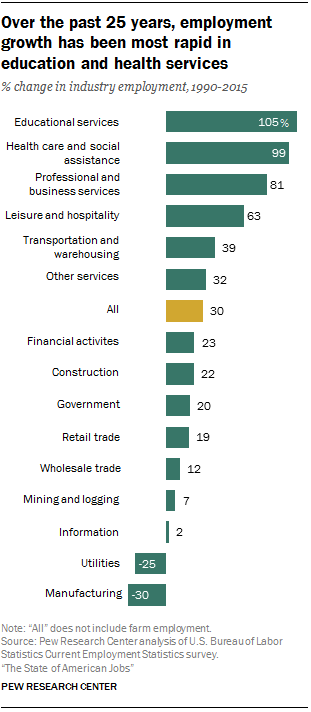Education and Employment Trends Underlie Populist Anxiety
Pew reports:
The number of workers in occupations requiring average to above-average education, training and experience increased from 49 million in 1980 to 83 million in 2015, or by 68%. This was more than double the 31% increase over the same period in employment, from 50 million to 65 million, in jobs requiring below-average education, training and experience.1
At the same time, the national survey – conducted May 25 to June 29, 2016, among 5,006 U.S. adults (including 3,096 employed adults) – shows how deeply Americans have internalized these trends:
Many see personal upgrading as a constant: More than half (54%) of adults in the labor force say it will be essential for them to get training and develop new skills throughout their work life in order to keep up with changes in the workplace. And 35% of workers, including about three-in-ten (27%) adults with at least a bachelor’s degree, say they don’t have the education and training they need to get ahead at work. Many are already taking action or being required to do so by their employer or by licensing requirements in their jobs: 45% of employed adults say they got extra training to improve their job skills in the past 12 months.
The public sees threats to jobs coming from several directions: Eight-in-ten adults say increased outsourcing of jobs to other countries hurts American workers, and roughly the same share (77%) say having more foreign-made products sold in the U.S. has been harmful. Significant shares also cite increased use of contract or temporary workers (57%) and declines in union membership (49%) as trends that are hurting, rather than helping, workers. At the same time, global markets for U.S.-made products are seen as helpful for workers by 68% of adults. And seven-in-ten say the rise of the internet and email has been a net positive.

